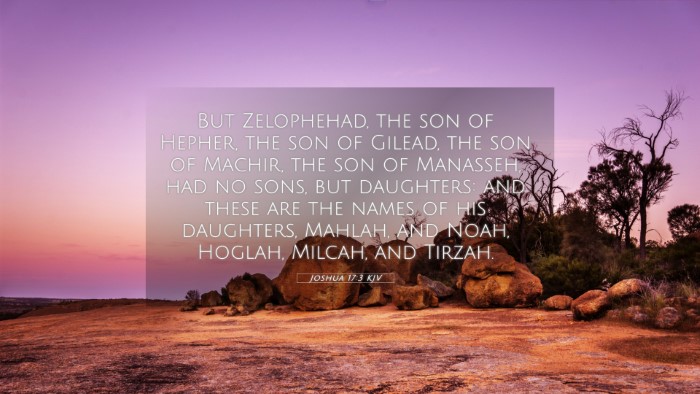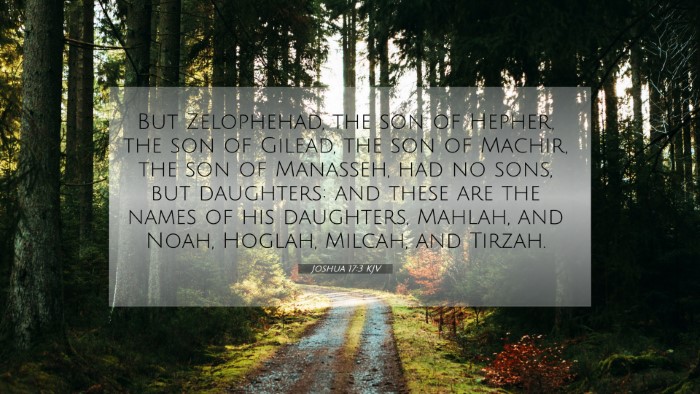Old Testament
Genesis Exodus Leviticus Numbers Deuteronomy Joshua Judges Ruth 1 Samuel 2 Samuel 1 Kings 2 Kings 1 Chronicles 2 Chronicles Ezra Nehemiah Esther Job Psalms Proverbs Ecclesiastes Song of Solomon Isaiah Jeremiah Lamentations Ezekiel Daniel Hosea Joel Amos Obadiah Jonah Micah Nahum Habakkuk Zephaniah Haggai Zechariah MalachiJoshua 17:3 Similar Verses
Joshua 17:3 Cross References
But Zelophehad, the son of Hepher, the son of Gilead, the son of Machir, the son of Manasseh, had no sons, but daughters: and these are the names of his daughters, Mahlah, and Noah, Hoglah, Milcah, and Tirzah.
Uncover the Rich Themes and Topics of This Bible Verse
Listed below are the Bible themes associated with Joshua 17:3. We invite you to explore each theme to gain deeper insights into the Scriptures.
Joshua 17:3 Cross Reference Verses
This section features a detailed cross-reference designed to enrich your understanding of the Scriptures. Below, you will find carefully selected verses that echo the themes and teachings related to Joshua 17:3 KJV. Click on any image to explore detailed analyses of related Bible verses and uncover deeper theological insights.
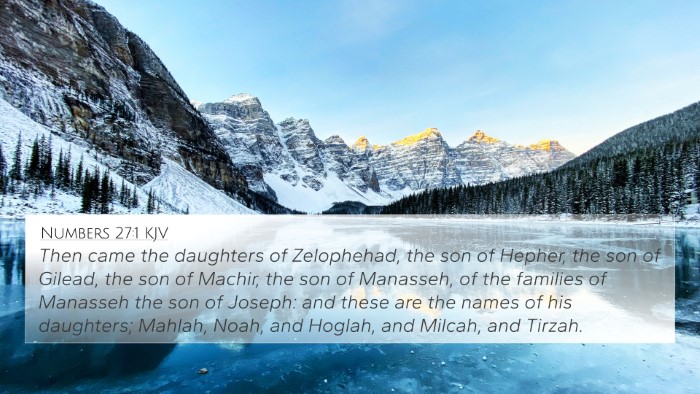
Numbers 27:1 (KJV) »
Then came the daughters of Zelophehad, the son of Hepher, the son of Gilead, the son of Machir, the son of Manasseh, of the families of Manasseh the son of Joseph: and these are the names of his daughters; Mahlah, Noah, and Hoglah, and Milcah, and Tirzah.
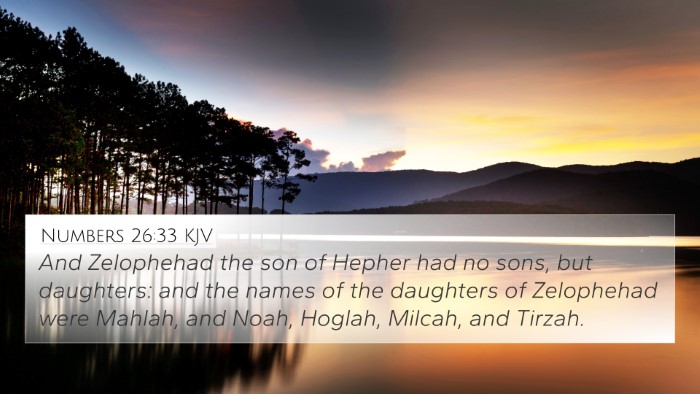
Numbers 26:33 (KJV) »
And Zelophehad the son of Hepher had no sons, but daughters: and the names of the daughters of Zelophehad were Mahlah, and Noah, Hoglah, Milcah, and Tirzah.
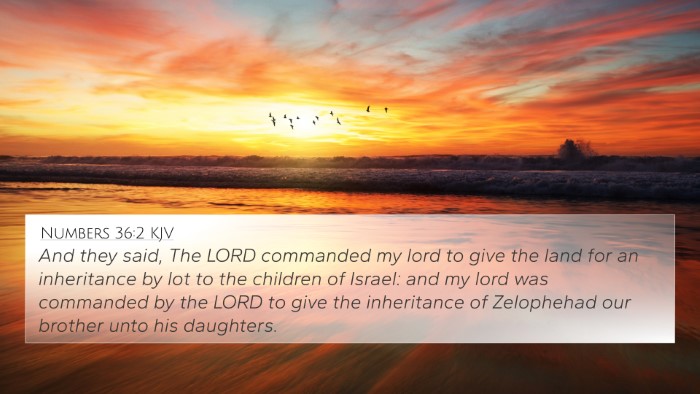
Numbers 36:2 (KJV) »
And they said, The LORD commanded my lord to give the land for an inheritance by lot to the children of Israel: and my lord was commanded by the LORD to give the inheritance of Zelophehad our brother unto his daughters.
Joshua 17:3 Verse Analysis and Similar Verses
Bible Verse Analysis: Joshua 17:3
Joshua 17:3 reads:
But Zelophehad the son of Hepher, the son of Gilead, the son of Makir, the son of Manasseh, had no sons, but only daughters. And these are the names of his daughters: Mahlah, Noah, Hoglah, Milcah, and Tirzah.
This verse provides important genealogical information and highlights the rights of women in inheritance, particularly in the context of Israel's tribal organization after conquest.
Commentary Insights
Matthew Henry emphasizes the significance of family lineage, particularly noting how Zelophehad's daughters were pivotal in seeking their father’s right to inheritance in the face of male-dominated customs. His commentary highlights that their bold request illustrates God’s justice and the principle that faith can challenge societal norms.
Albert Barnes comments on the uniqueness of Zelophehad’s case, as it reveals a shift in understanding inheritance laws. He notes that the daughters’ claim was rooted in their father’s unconditional faith in God’s promises, thereby establishing a doctrine of equality in inheritance practices. This event also establishes a precedent for future cases concerning inheritance rights amongst women.
Adam Clarke elaborates on the cultural context of inheritance laws in ancient Israel. He points out that Zelophehad's daughters effectively served as instruments of God’s provision, emphasizing that their story is an instructive guide for addressing issues of justice and fairness within societal structures. This highlights a transformative moment in Israel’s legal frameworks regarding women’s rights.
Thematic Connections
The themes in Joshua 17:3 prompt deeper exploration into various connections throughout Scripture:
- Numbers 27:1-11: This passage recounts the initial request of Zelophehad’s daughters to Moses, which serves as the foundation for their rights. They exemplify courage in seeking justice in their inheritance.
- Galatians 3:28: This New Testament verse illustrates the equality of believers in Christ, reflecting the underlying theme of justice found in the daughters of Zelophehad.
- Luke 18:1-8: The parable of the persistent widow parallels the determination of the daughters to secure their inheritance rights.
- Proverbs 31:10-31: The virtuous qualities of a Proverbs 31 woman resonate in the character of Zelophehad's daughters as they advocate for their rights.
- Matthew 5:14-16: This passage about being the light of the world connects to the idea of standing firm for justice and truth as demonstrated by Zelophehad’s daughters.
- Exodus 34:24: The promise of God’s protection for the vulnerable ties into the narrative of these daughters seeking justice within their societal context.
- 1 Peter 3:7: Emphasizing the partner's role in providing honor sheds light on the relationship dynamics mirrored by the familial role of the daughters.
- Deuteronomy 21:15-17: This passage on inheritance laws can be cross-referenced to understand the broader implications of family rights and roles in Israel.
- Romans 8:17: Sharing in heirship with Christ reflects the same principle of inheritance, emphasizing inclusion and equality before God.
- Mark 12:18-27: The Sadducees question Jesus about resurrection and inheritance, connecting to the broader theme of life after death and divine justice.
Cross-Referencing Insights
Joshua 17:3 invites extensive cross-referencing that enriches understanding:
- Cross-referencing biblical texts can reveal how the inheritance discussions in Numbers set a precedent that impacts future teachings.
- Examining the thematic connections between Old and New Testament teachings helps to highlight God’s unchanging nature regarding justice.
- Tools for Bible cross-referencing can provide insights into understanding complex family dynamics and their societal implications.
- Exploring Bible concordance can facilitate a deeper study of how these themes are recurrent in different parts of Scripture.
- The comparative analysis of Pauline epistles uncovers additional dimensions of communal living and rights within early Christian communities.
- Utilizing a Bible cross-reference guide can enhance one’s study, making connections clearer and reinforcing key Biblical principles on justice.
- Interpreting Biblical themes through cross-references is crucial in understanding the role of women across historical contexts.
Conclusion
In summary, Joshua 17:3 serves as a powerful testament to the importance of family rights and justice in inheritance laws. By studying this verse alongside related passages, readers can gain a deeper understanding of the themes of equality and divine justice, as well as the critical role of women in biblical narratives.
This analysis encourages readers to further engage with the Scriptures through thematic Bible verse connections and the exploration of cross-referenced passages that enrich their study of God’s Word.

